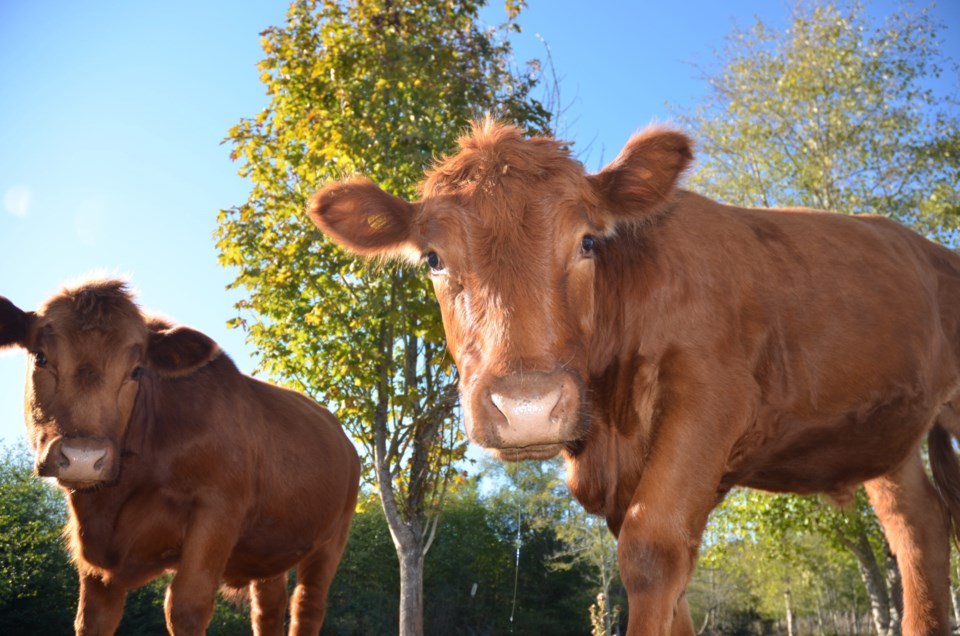Since Facebook is in the news this week announcing plans for its online Metaverse, let’s talk about Facebook.
One of the benefits of living in rural BC are the wide open spaces, lush fields, and backcountry roads where you can walk or drive for miles for the most part all by yourself – except for the cows, that is.
The B.C. Interior is cattle country. They’re everywhere, at least until you’re looking to buy some for dinner.
I can go on The Social Platform That Must Not Be Named any time of day and buy any manner of useless new or used item. The platform’s marketplace is teeming with treasures that aren’t: expired child car seats, bald tires, bikes of questionable provenance.
But try to buy a pound of local hamburger here in cattle country, that’s a violation of the platform’s community standards.
According to Facebook rules on prohibited content: “Listings may not promote the buying or selling of animals or animal products.”
That includes “products from animals intended for consumption, such as raw fish, meat, or eggs,” and any live animals, including livestock. The ban covers Facebook’s Marketplace and buy and sell pages.
To sum up:
Stolen bikes, yes.
Farm fresh eggs, no.
MLM pyramid schemes, yes.
Farm-to-table local beef, no.
Animal food products from your local farmer and rancher are akin to guns, drugs, and sexual services in the eyes of the social media giant.
This has been the case since People for the Ethical Treatment of Animals, PETA, bought shares in Facebook in July 2019. The group did this in response to Facebook’s decision to put warning labels on PETA videos for graphic content but once they had an in, the group wasted no time in forcing their extreme views on the platform.
Ads for direct-from-the-farm products are quickly blocked, and pages that violate the rule can be suspended. Enforcement ebbs and flows but the ban remains in place.
Ranchers are nothing if not creative problem-solvers, though, and I’ve seen Facebook ads for “butt nuggets” and a suggestion for “pre-wrapped pink farm animals” on Cariboo community pages.
It’s funny, but it’s not a solution.
The B.C. government spent $2 million this year on Buy BC branding for food and beverage producers and additional funds for its MarketplaceBC and BuyLocalBC websites. The next logical step is to allow ranchers and farmers to do more than list their names on these sites, but actually have a region-by-region marketplace where they can make sales direct to local consumers.
These type of marketplaces have been successful in Australia and the U.S. Midwest, where the Facebook ban also cut off what was becoming a solid market for farmers and ranchers.
Farmers markets are grand but they are only a seasonal option and few ranchers have the time to staff a booth at the local market all summer.
Ranchers and farmers have enough hurdles to staying in business. They earn a very small portion of the price consumers pay at the grocery store. The industry gets smacked for its outsized carbon footprint owed mostly to the emissions from transportation but regulations and inter-provincial trade barriers leave few other options.
The demand for local BC products is there. The supply is there. Now we just need some common sense solutions to make it happen.
Dene Moore is an award-winning journalist and writer. A news editor and reporter for The Canadian Press news agency for 16 years, Moore is now a freelance journalist living in the South Cariboo.
SWIM ON:
- Last week, Dene Moore wrote that BC’s forestry management practices have needed updating for years – and while there are some positive steps in the NDP’s new bill, it leaves a lot left to do, especially for forestry-dependent communities.
- Peace River South has some of BC’s lowest vaccination rates – and its BC Liberal MLA, Mike Bernier, has faced threats over his support for public health measures (Yes, including on Facebook.) He doesn’t plan on bending any time soon.
- In 2019, Ada Slivinski considered the double-edged sword of Facebook sales.



